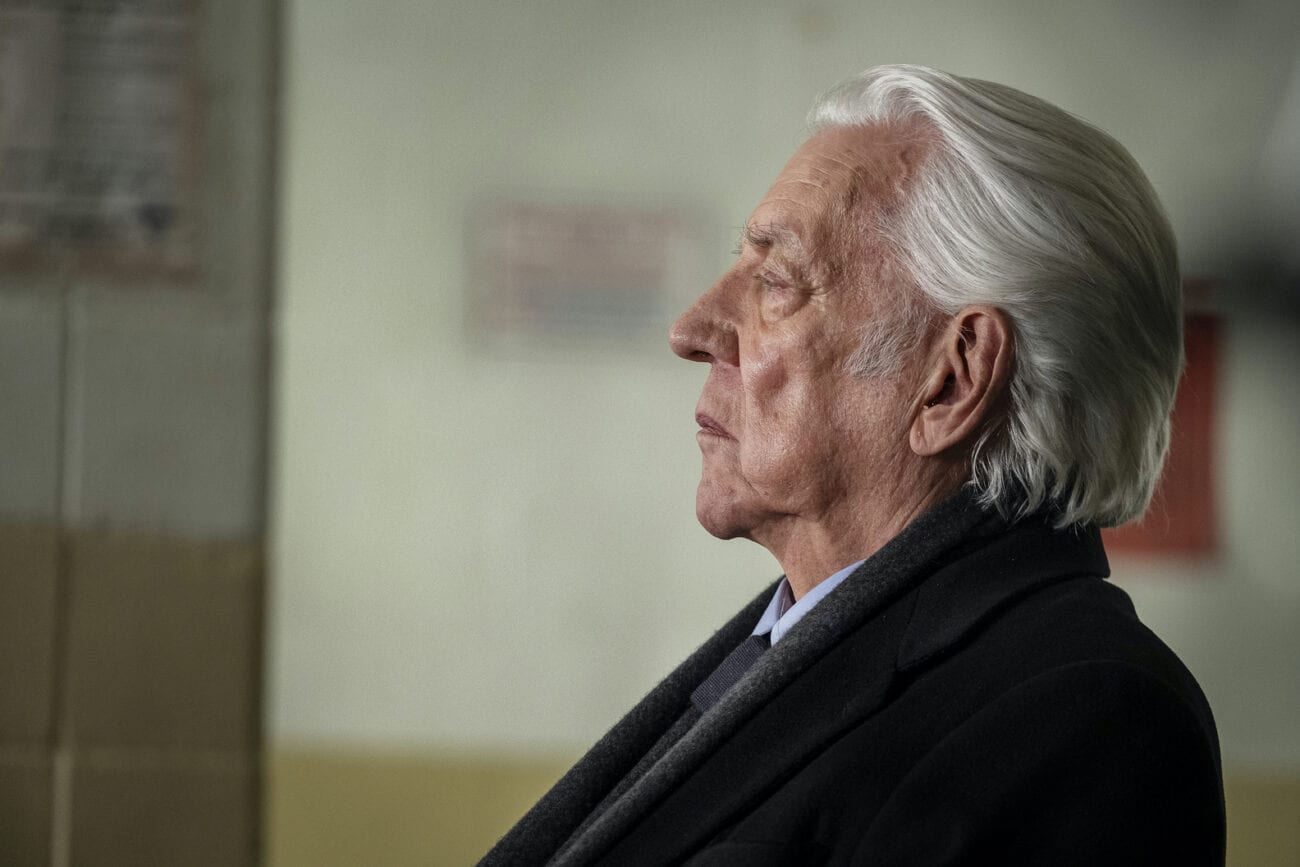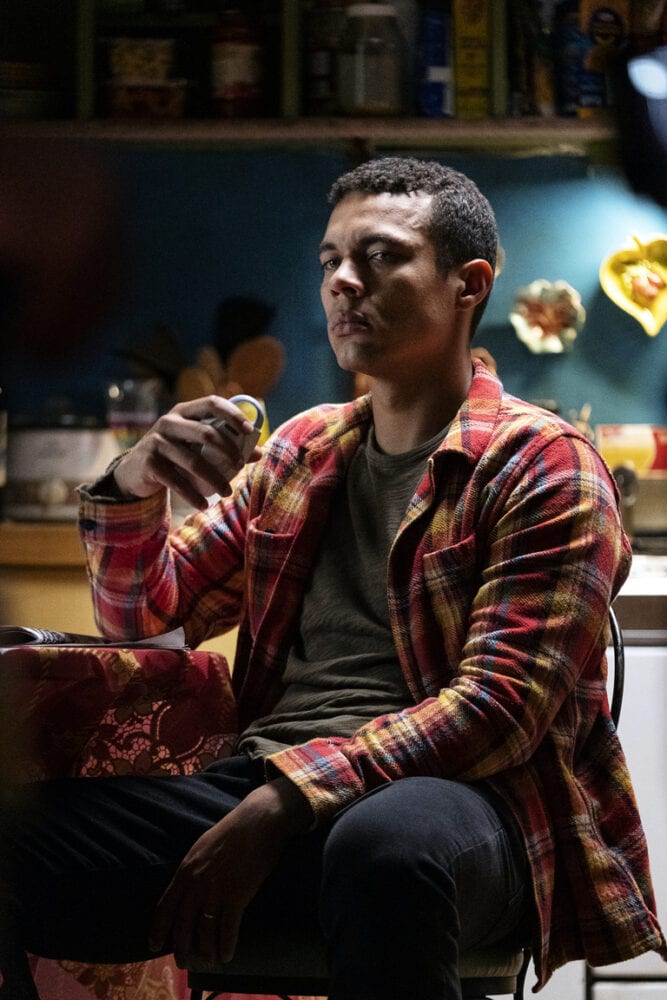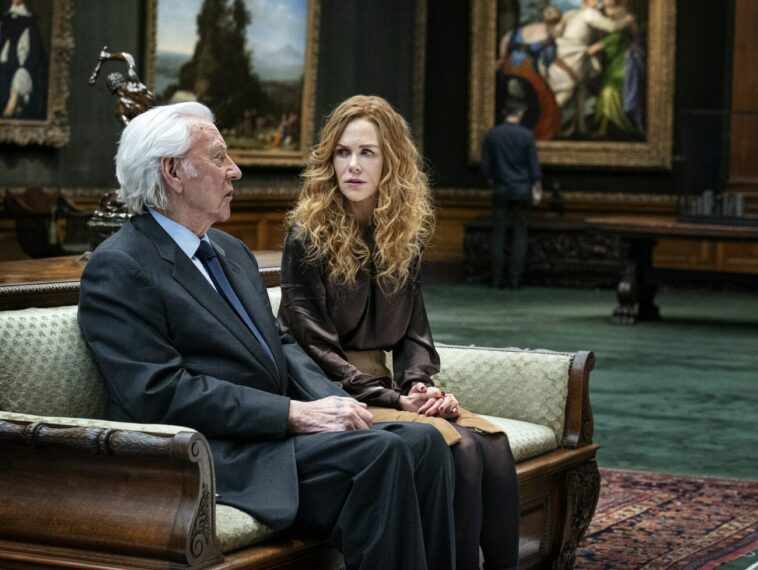It’s not entirely clear whether the ending of The Undoing Episode 4 (“See No Evil”) is meant to be a cliffhanger. It is certainly presented as such—with Jonathan saying during his TV interview that he has an idea as to who may have killed Elena—but in light of the other events of the episode (and indeed the entirety of The Undoing so far), it’s hard to believe that he has some shocking information that we will be excited to learn next week.
Rather, I’m led to think that this is merely a matter of Jonathan and Haley Fitzgerald pursuing their goals for the televised interview. This was part of the plan, as was the moment when Jonathan expressed that a woman he loved (Elena) was dead and that the charges against him didn’t make that go away.
This is a risky move on his part, both because his intimate connection with Elena is bound to form a lynchpin of the prosecution’s case against him, and because it is Grace and Franklin he has to thank for being out on bail and represented by Fitzgerald in the first place.
Of course, this has already occurred in spite of the fact that Franklin believes Jonathan to be guilty (or at least told him so to his face, which seems like a pretty good indication). Yet Episode 4 also sees Jonathan trying to reconcile with Grace, and though she rebuffs him this does not strike me as outside the realm of possibility. It’s one that Franklin sees too, to the point that he confesses his own history of infidelity to his daughter, urging her not to hold up her parents’ marriage as some kind of model.
What’s most striking to me in that scene, however, is Grace’s resistance. She veritably refuses to believe that her father was a bad husband. She could see that he loved her mother. But, of course, Franklin does not deny that he did. On the contrary, he explains how this led him to time and again seek his way back into his wife’s good graces. And it worked.
He’s right that Jonathan is like him in this way: he’s a charming man who casts a spell over others. Perhaps that charm has faded a bit for Franklin in his old age, but he is certainly used to getting what he wants. See the threats he levels at Dean Connaver in relation to the suggestion that Henry be homeschooled until this whole ugly affair is over. You haven’t seen ugly yet.

And so as much as Haley Fitzgerald was testing Jonathan when she went on about his ability to mesmerize, it is in fact this attribute of his that she moves to deploy with the TV interview. Jonathan needs to be chastised for thinking he can win over the husband of the woman he’s accused of brutally murdering (and I do think he believed that he could), but his charisma is undeniable.
So he believes that saying he loved Elena on TV risks no further harm to his marriage. He believes that he will be able to win Grace back. He is not perfect for her but has for years molded himself for her in the image of her idea of perfection. Increasingly I think he is a narcissist in clinical terms, which of course would be incredibly difficult for Grace to admit to herself at this point. She’s spent years, despite her psychological training, viewing Jonathan through the mantra “See No Evil.”
This is how I interpret the title of The Undoing Episode 4, which is very much in line with last week’s “Do No Harm”—it is a matter of Grace protecting herself and her conception of the world from the threat to undo it all that Jonathan’s case represents. She wants to believe him and to put her proverbial hands over her eyes in relation to his wrongs. And I suspect this will hold even in light of her reaction to his TV interview. Sure he’s told everyone that he was in love with another woman, but he really just meant that he cared for her—perhaps too much—and of course it is hard for him that someone (who is very much not him) bludgeoned her to death with a sculpting hammer.
So I don’t think we’ll be learning any new information from Jonathan in Episode 5 that will meaningfully change how the mystery that forms the center of The Undoing is shaping up. Who are the suspects besides him? Fernando? If Jonathan thought that Fernando was the murderer, his whole visit would make no sense. Are there other forces at play that we’ve yet to learn about? This strikes me as more of a red herring than anything else.

Now, it does seem to be the case that Elena may have been a bit unhinged. The portrait of Grace that Mendoza and O’Rourke show to her in Episode 4 has quickly made the list of mysteries I’m intrigued by (which who killed Elena isn’t really on—I am pretty sure Jonathan did it). Under what circumstances was this portrait painted? The detectives are perfectly warranted in wondering whether Grace posed for it, and I find myself wondering that too since I have decided I don’t trust her.
But that doesn’t seem terribly likely, unless Grace has some kind of dissociative disorder that’s had her doing things in a fugue state, which I suppose you could spin a theory around from the scene of her fainting in the park and her walk by Elena’s studio. This seems far-fetched to me, though.
What seems more likely is that Jonathan was involved in some way, perhaps providing Elena with photographs or even commissioning her to paint the portrait. Maybe this wasn’t the act of a problematically obsessed woman after all, or maybe it was. Regardless, these details are something that I hope to learn over the course of the final two episodes of The Undoing, and I will be disappointed if things don’t hang together well.
Even more so, I’m still wondering about Jonathan’s plan to “attend a convention in Cleveland” and am a bit bewildered that Grace isn’t more concerned about the whole story with regard to that. She’s had a lot to deal with, true, and has moved fairly directly from paranoiac uncertainty to delusional belief, but it seems like this should be a sticking point—his plan to be away from his family existing before Elena was killed. Why?
As much as it is floated as a truism, I do not think it is true that “innocent people do not flee.” This strikes me as one of those ideas that makes problematic assumptions about human behavior, like thinking that a person would never confess to a crime they did not commit. Perhaps it is not rational to flee, but who said human beings are rational? And beyond that, doesn’t not fleeing rely more on trusting the authorities than anything else? It’s hard for me to see how you could really have faith that the innocent will be acquitted while the guilty will get their comeuppance from looking at the facts on the ground when it comes to our justice system.
None of which is to say that I think Jonathan is innocent. I think he’s guilty. We know he is guilty of great deception, but that doesn’t make him a murderer. Is he capable of being one? Of course, anyone is. This whole idea of assessing a person’s character and deciding they don’t have it in them is hogwash.
It stems from our desire to see no evil. We want to believe that other people are basically good, just like we want to believe that others agree with us about things unspoken. It’s a shock to find out when they don’t, but one we should be getting used to in the age of social media, as people divulge all sorts of things about themselves that were previously hidden. Perhaps to love one another we have to look past them. Perhaps to love one another we have to pretend. See no evil.
I’m not drawing a line from Jonathan’s adultery to the murder in the sense of thinking that because he is guilty of one immorality he must be guilty of the other. That would be a fallacy. But the fact is that if you strip away any notion of believing anything that this man says, the case against him is rather stark. He had motive, means, and opportunity.
If you wanted to frame someone for a crime, I don’t know if you could do much better. And of course Jonathan doesn’t even claim he was framed. He doesn’t try to explain his behavior in any plausible way to Grace, even, but just insists that she knows his heart and that he couldn’t have done such a thing.
But this doesn’t mean that he won’t get away with it. Grace has decided to help him for the sake of their son (and herself). Franklin has decided to help for the sake of his daughter. And the thesis of the show may well lie in the scene where he tells Dean Connaver that he will destroy anyone who harms his family.
Note that there is nothing here about justice. Franklin believes Jonathan is guilty but helps him anyway. Grace chooses to believe in the thin possibility that he is not and to look away from all of the indications that he is. See no evil.
Haley Fitzgerald has promised to muck up the wheels of justice and the TV interview she arranges for Jonathan to do at the end of Episode 4 should be seen precisely in this light. Put the charming—nay mesmerizing—man on television and see if people don’t choose to believe him because they want to.
This is not a story about justice, but about ugliness. And I fear, as Franklin says, we have not yet truly seen the ugliness.


I just read your article after finishing episode 4. The one thing I noticed is Jonathan’s (Hugh Grants) depiction of an attempt at displaying grief. This is so well done by the actor, because he knows they/Narcissists can’t grieve, and do a really rather awkward attempt of displaying it. I have seen this upfront in real life on many occasions, and so picked up on it right away. I still believe that Franklin did it, as he left the party/ school fundraiser early. He must have known that Jonathan was cheating on Grace, and put a stop to it? Can’t wait for the next episode! When charming narcissists try and convince others of their innocence, it’s still quite stomach churning! Hugh Grant gets this on a personal level, after surviving the sting of Rupert Murdoch.
Hm, that’s interesting if you’re suggesting that Grant is doing a good job at portraying Jonathan doing a bad job of acting. Is that what you mean? I don’t know how well I think it would track for it to be Franklin. I suppose we’ll see but I was prone to believe that he actually thinks that Jonathan is guilty and it sort of seems to me that if I follow your logic he would have killed Jonathan instead of Elena. He certainly doesn’t seem to want to see the couple reconcile. So I don’t know. I’ve just had the feeling that this was going to be one of those things where the “twist” was that there is no twist and Jonathan did in fact do it. I suppose I do hope they manage to pull something off that is more interesting than that, though it is maybe not uninteresting for the show itself to kind of serve as an example of how no one wants to think he’s guilty. I don’t know. Thanks for reading!